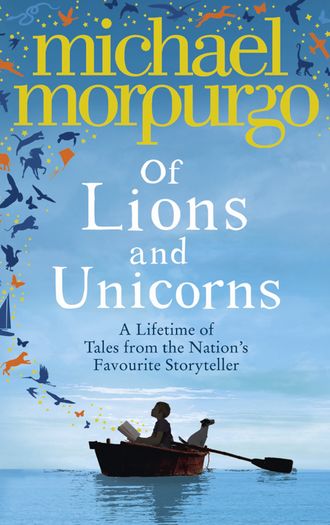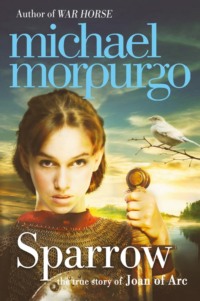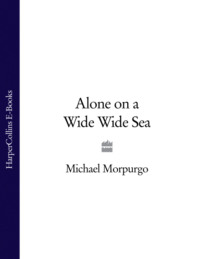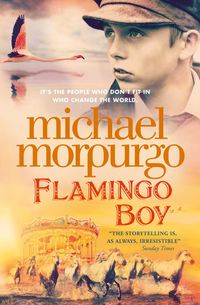
Полная версия
Of Lions and Unicorns: A Lifetime of Tales from the Master Storyteller
A city boy all my life, the paintings really did look like the paradise my mother had promised me. So by the time she put me on the train at the Gare de Lyon I was really looking forward to it. Blowing kisses to her for the last time out of the train window, I think the only reason I didn’t cry was because I was quite sure by now that I was indeed going to the most wonderful place in the world, the place where Cézanne, the greatest painter in the world, painted his pictures, where Jean Giono’s old shepherd walked the high hills planting his acorns to make a forest.
Aunt Mathilde met me off the train and enveloped me in a great bear hug and pinched my cheek. It wasn’t a good start. She introduced me to my cousin Amandine, who barely acknowledged my existence, but who was very beautiful. On the way to the car, following behind Aunt Mathilde, Amandine told me at once that she was fourteen and much older than I was and that I had to do what she said. I loved her at once. She wore a blue and white gingham dress, and she had a ponytail of chestnut hair that shone in the sunshine. She had the greenest eyes I’d ever seen. She didn’t smile at me, though. I so hoped that one day she would.
We drove out of town to Vauvenargues, Aunt Mathilde talking all the way. I was in the back seat of the Deux Chevaux and couldn’t hear everything, but I did pick up enough to understand that Uncle Bruno ran the village inn. He did the cooking and everyone helped. “And you’ll have to help too,” Amandine added without even turning to look at me. Everywhere about me were the gentle hills and folding valleys, the little houses and dark pointing trees I’d seen in Cézanne’s paintings. Uncle Bruno greeted me wrapped in his white apron. Mother was right. He did have a huge hedgehog of a moustache that prickled when he kissed me. I liked him at once.
I had my own little room above the restaurant, looking out over a small back garden. An almond tree grew there, the pink blossoms brushing against my window pane. Beyond the tree were the hills, Cézanne’s hills. And after supper they gave me a crystallised fruit, apricot, my favourite. All that and Amandine too. I could not have been happier.
It became clear to me very quickly that whilst I was made to feel very welcome and part of the family – Aunt Mathilde was always showing me off proudly to her customers as her nephew, “her beautiful little man from Paris” – I was indeed expected to do what everyone else did, to do my share of the work in the inn. Uncle Bruno was almost always busy in the kitchen. He clanked his pots and sang his songs, and would waggle his moustache at me whenever I went in, which always made me giggle. He was happiest in his kitchen, I could tell that. Aunt Mathilde bustled and hustled; she liked things to be just so. She greeted every customer like a long-lost friend. She was the heart and soul of the place. As for Amandine, she took me in hand at once, and explained that I’d be working with her, that she’d been asked to look after me. She did not mince her words. I could not expect to spend my summer with them, she said, and not earn my keep.
She put me to work at once in the restaurant, laying tables, clearing tables, cutting bread, filling up breadbaskets, filling carafes of water, making sure there was enough wood on the fire in the evenings, and washing up, of course. After just one day I was exhausted. Amandine told me I had to learn to work harder and faster, but she did kiss me goodnight before I went upstairs, which was why I did not wash my face for days afterwards.
At least I had the mornings to myself. I made the best of the time I had, exploring the hills, stomping through the woods, climbing trees. Amandine never came with me. She had lots of friends in the village, bigger boys who stood about with their thumbs hooked into the pockets of their blue jeans, and roared around on motor scooters with Amandine clinging on behind, her hair flying. These were the boys she smiled at, the boys she laughed with. I was more sad than jealous, I think; I simply loved her more than ever.
There was a routine to the restaurant work. As soon as customers had left, Amandine would take away the wine glasses and the bottles and the carafes. The coffee cups and cutlery were my job. She would deal with the ashtrays, whilst I scrunched up the paper tablecloths and threw them on the fire. Then we’d lay the table again as quickly as possible for the next guests. I worked hard because I wanted to please Amandine, and to make her smile at me. She never did.
She laughed at me, though. She was in the village street one morning, her motor-scooter friends gathered adoringly all around her, when she turned and saw me. They all did. Then she was laughing and they were too. I walked away knowing I should be hating her, but I couldn’t. I longed all the more for her smile. I longed for her just to notice me. With every day she didn’t I became more and more miserable, sometimes so wretched I would cry myself to sleep at nights. I lived for my mother’s letters and for my mornings walking the hills that Cézanne had painted, gathering acorns from the trees Jean Giono’s old shepherd had planted. Here, away from Amandine’s indifference, I could be happy for a while and dream my dreams. I thought that one day I might like to live in these hills myself, and be a painter like Cézanne, the greatest painter in the world, or maybe a wonderful writer like Jean Giono.
I think Uncle Bruno sensed my unhappiness, because he began to take me more and more under his wing. He’d often invite me into his kitchen and let me help him cook his soupe au pistou or his poulet romarin with pommes dauphinoises and wild leeks. He taught me to make chocolate mousse and crème brûlée, and before I left he’d always waggle his moustache for me and give me a crystallised apricot. But I dreaded the restaurant now, dreaded having to face Amandine again and endure the silence between us. I dreaded it, but would not have missed it for the world. I loved her that much.
Then one day a few weeks later I had a letter from my mother saying she was much better now, that Aunt Mathilde would put me on the train home in a few days’ time. I was torn. Of course I yearned to be home again, to see my mother, but at the same time I did not want to leave Amandine.
That evening Amandine told me I had to do everything just right because their best customer was coming to dine with some friends. He lived in the chateau in the village, she said, and was very famous; but when I asked what he was famous for, she didn’t seem interested in telling me.
“Questions, always questions,” she tutted. “Go and fetch in the logs.”
Whoever he was, he looked ordinary enough to me, just an old man with not much hair. But he ate one of the crème brûlées I’d made and I felt very pleased a famous man had eaten one of my crème brûlées. As soon as he and his friends had gone we began to clear the table. I pulled the paper tablecloth off as usual, and as usual scrunched it up and threw it on the fire. Suddenly Amandine was rushing past me. For some reason I could not understand at all she grabbed the tongs and tried to pull the remnants of the burning paper tablecloth out of the flames, but it was already too late. Then she turned on me.
“You fool!” she shouted. “You little fool!”
“What?” I said.
“That man who just left. If he likes his meal he does a drawing on the tablecloth for Papa as a tip, and you’ve only gone and thrown it on the fire. He’s only the most famous painter in the world. Idiot! Imbecile!” She was in tears now. Everyone in the restaurant had stopped eating and gone quite silent.
Then Uncle Bruno was striding towards us, not his jolly self at all. “What is it?” he asked Amandine. “What’s the matter?”
“It was Yannick, Papa,” she cried. “He threw it on the fire, the tablecloth, the drawing.”
“Had you told him about it, Amandine?” Uncle Bruno asked. “Did Yannick know about how sometimes he sketches something on the tablecloth, and how he leaves it behind for us?”
Amandine looked at me, her cheeks wet with tears. I thought she was going to lie. But she didn’t.
“No, Papa,” she said, lowering her head.
“Then you shouldn’t be blaming him, should you, for something that was your fault. Say sorry to Yannick now.” She mumbled it but she never raised her eyes. Uncle Bruno put his arm round me and walked me away. “Never mind, Yannick,” he said. “He said he particularly liked his crème brûlée. That’s probably why he left the drawing. You made the crème brûlée, didn’t you? So it was for you really he did it. Always look on the bright side. For a moment you had in your hands a drawing done for you and your crème brûlée by the greatest painter in the world. That’s something you’ll never forget.”
Later on as I came out of the bathroom I heard Amandine crying in her room. I hated to hear her crying, so I knocked on the door and went in. She was lying curled up on her bed hugging her pillow.
“I’m sorry,” I said. “I didn’t mean to upset you.” She had stopped crying by now.
“It wasn’t your fault, Yannick,” she said, still sniffing a bit. “It’s just that I hate it when Papa’s cross with me. He hardly ever is, only when I’ve done something really bad. I shouldn’t have blamed you. I’m sorry.”
And then she smiled at me. Amandine smiled at me!
I lay awake all night, my mind racing. Somehow I was going to put it all right again. I was going to make Amandine happy. By morning I had worked out exactly what I had to do and how to do it, even what I was going to say when the time came.
That morning, I didn’t go for my walk in the hills. Instead I made my way down through the village towards the chateau. I’d often wondered what it was like behind those closed gates. Now I was going to find out. I waited till there was no one about, no cars coming. I climbed the gates easily enough, then ran down through the trees. And there it was, immense and forbidding, surrounded by forest on all sides. And there he was, the old man with very little hair I had seen the night before. He was sitting alone in the sunshine at the foot of the steps in front of the chateau, and he was sketching. I approached as silently as I could across the grass, but somehow I must have disturbed him. He looked up, shading his eyes against the sun. “Hello, young man,” he said. Now that I was this close to him I could see he was indeed old, very old, but his eyes were young and bright and searching.
“Are you Monsieur Cézanne?” I asked him. “Are you the famous painter?” He seemed a little puzzled at this, so I went on. “My mother says you are the greatest painter in the world.”
He was smiling now, then laughing. “I think your mother’s probably right,” he said. “You clearly have a wise mother, but what I’d like to know is why she let a young lad like you come wandering here on his own?”
As I explained everything and told him why I’d come and what I wanted, he looked at me very intently, his brow furrowing. “I remember you now, from last night,” he said, when I’d finished. “Of course I’ll draw another picture for Bruno. What would he like? No. Better still, what would you like?”
“I like sailing boats,” I told him. “Can you do boats?”
“I’ll try,” he replied with a smile.
It didn’t take him long. He drew fast, never once looking up. But he did ask me questions as he worked, about where I’d seen sailing boats, about where I lived in Paris. He loved Paris, he said, and he loved sailing boats too.
“There,” he said, tearing the sheet from his sketchbook and showing me. “What do you think?” Four sailing boats were racing over the sea out beyond a lighthouse, just as I’d seen them in Brittany. But I saw he’d signed it Picasso.
“I thought your name was Cézanne,” I said.
He smiled up at me. “How I wish it was,” he said sadly. “How I wish it was. Off you go now.”
I ran all the way back to the village, wishing all the time I’d told him that I was the one who had made the crème brûlée he’d liked so much. I found Amandine by the washing line, a clothes peg in her mouth. “I did it!” I cried breathlessly, waving the drawing at her. “I did it! To make up for the one I burned.”
Amandine took the peg out of her mouth and looked down at the drawing.
“That’s really sweet of you to try, Yannick,” she said. “But the thing is, it’s got to be done by him, by Picasso himself. It’s no good you drawing a picture and then just signing his name. It’s got to be by him or it’s not worth the money.”
I was speechless. Then as she turned away to hang up one of Uncle Bruno’s aprons, Aunt Mathilde came out into the garden with a basket of washing under her arm.
“Yannick’s been very kind, Maman,” Amandine said. “He’s done me a drawing. After what happened last night. It’s really good too.”
Aunt Mathilde had put down her washing and was looking at the drawing. “Bruno!” she called. “Bruno, come out here!” And Uncle Bruno appeared, his hands white with flour. “Look at this,” said Aunt Mathilde. “Look what Yannick did, and all by himself too.”
Bruno peered at it closely for a moment, then started to roar with laughter. “I don’t think so,” he said. “Yannick may be a genius with crème brûlée, but this is by Picasso, the great man himself. I promise you. Isn’t it, Yannick?”
So I told them the whole story. When I’d finished, Amandine came over and hugged me. She had tears in her eyes. I was in seventh heaven, and Uncle Bruno waggled his moustache and gave me six crystallised apricots. Unfortunately Aunt Mathilde hugged me too and pinched my cheek especially hard. I was the talk of the inn that night, and felt very proud of myself. But best of all Amandine came on my walk in the hills the next day and climbed trees with me and collected acorns, and held my hand all the way back down the village street, where everyone could see us, even the motor-scooter boys in their blue jeans.
They still have the boat drawing by Picasso hanging in the inn. Amandine runs the place now. It’s as good as ever. She married someone else, as cousins usually do. So did I. I’m a writer still trying to follow in Jean Giono’s footsteps. As for Cézanne, was my mother right? Is he the greatest painter in the world? Or is it Picasso? Who knows? Who cares? They’re both wonderful and I’ve met both of them – if you see what I’m saying.

Some years ago, we got to know Elisabeth Frink, a wonderful sculptor, particularly of horses, and a kind and generous person too. She became a great friend and ally in life. Sadly, she died all too young. Her very last work now hangs above the west door of Liverpool Cathedral. It is a Risen Christ.

The bike was new that Christmas. It was maroon, and I remember it was called a Raleigh Wayfarer. It had all you could ever dream of in a bike – in those days. It had a bell, a dynamo lamp front and rear, five gears and a silver pump. I loved it instantly and spent every hour I could out riding it. And when I wasn’t riding it, I was polishing it.
We lived on the edge of town, so it was easy to ride off down Mill Lane past the estate, along the back of the soap factory where my father worked, and then out into the countryside beyond. How I loved it. In a car, you zoomed past so fast that the cows and the trees were only ever brief, blurred memories. On my bike I was close to everything for the first time. I felt the cold and the rain on my face. I mooed at the cows, and they looked up and blinked at me lazily. I shouted at the crows and watched them lift off cawing and croaking into the wind. But best of all, no one knew where I was – and that included me sometimes. I was always getting myself lost and coming back at dusk, late. I would brace myself for all the sighing and tutting and ticking off that inevitably followed. I bore it all stoically because they didn’t really mean it, and anyway it had all been worth it. I’d had a taste of real freedom and I wanted more of it.
After a while I discovered a circuit that seemed to be just about ideal. It was a two-hour run, not too many hills going up, plenty going down, a winding country lane that criss-crossed a river past narrow cottages where hardly anyone seemed to live, under the shadow of a church where sometimes I stopped and put flowers on the graves that everyone else seemed to have forgotten, and then along the three-barred iron fence where the horses always galloped over to see me, their tails and heads high, their ears pricked.
There were three of them: a massive bay hunter that looked down on me from a great height, a chubby little pony with a face like a chipmunk, and a fine-boned grey that flowed and floated over the ground with such grace and ease that I felt like clapping every time I saw her move. She made me laugh too because she often made rude, farty noises as she came trotting over to see me. I called her Peg after a flying horse called Pegasus that I’d read about in a book. The small one I called Chip, and the great bay, Big Boy. I’d cuddle them all, give each of them a sugar lump – two for Peg because she wasn’t as pushy as the other two – told them my troubles, cuddled them a little more and went on my way, always reluctantly.
I hated to leave them because I was on my way back home after that, back to homework, and the sameness of the house, and my mother’s harassed scurrying and my little brother’s endless tantrums. I lay in my room and dreamed of those horses, of Peg in particular. I pictured myself riding her bareback through flowery meadows, up rutty mountain passes, fording rushing streams where she’d stop to drink. I’d go to sleep at nights lying down on the straw with her, my head resting on her warm belly. But when I woke, her belly was always my pillow, and my father was in the bathroom next door, gargling and spitting into the sink, and there was school to face, again. But after school I’d be off on my bike and that was all that mattered to me. I gave up ballet lessons on Tuesdays. I gave up cello lessons on Fridays. I never missed a single day, no matter what the weather – rain, sleet, hail – I simply rode through it all, living for the moment when Peg would rest her heavy head on my shoulder and I’d hear that sugar lump crunching inside her great grinding jaw.
It was spring. I know that because there were daffodils all along the grass verge by the fence, and there was nowhere to lie my bike down on the ground without squashing them. So I leant it up against the fence and fished in my pocket for the sugar lumps. Chip came scampering over as he always did, and Big Boy wandered lazily up behind him, his tail flicking nonchalantly. But I saw no sign of Peg. When Big Boy had finished his sugar lump, he started chewing at the saddle of my bike and knocked it over. I was just picking it up when I saw her coming across the field towards me. She wore long green boots and a jersey covered in plants and stars, gold against the dark, deep blue of space. But what struck me most was her hair, the wild white curly mop of it, around her face that was somehow both old and young at the same time.
“Who are you?” she asked. It was just a straight question, not a challenge.
“Bonnie,” I replied.
“She’s not here,” said the woman.
“Where is she?”
“It’s the spring grass. I have to keep her inside from now on.”
“Why?”
“Laminitis. She’s fine all through the winter, eats all the grass she likes no trouble. But she’s only got to sniff the spring grass and it comes back. It heats the hoof, makes her lame.” She waved away the two horses and came closer, scrutinising me. “I’ve seen you before, haven’t I? You like horses, don’t you?” I smiled. “Me too,” she went on. “But they’re a lot of work.”
“Work?” I didn’t understand.
“Bring them in, put them out, groom them, pick out their feet, feed them, muck them out. I’m not as young as I was, Bonnie. You don’t want a job do you, in the stables? Be a big help. The grey needs a good long walk every day, and a good mucking out. Three pounds an hour, what do you say?”
Just like that. I said yes, of course. I could come evenings and weekends.
“I’ll see you tomorrow then,” she said. “You’ll need wellies. I’ve got some that should fit. You be careful on the roads now.” And she turned and walked away.
I cycled home that day singing my heart out and high as a kite. It was my first paying job, and I’d be looking after Peg. It really was a dream come true.
I didn’t tell anyone at home, nor at school. Where I went on my bike, what I did, was my own business, no one else’s. Besides there was always the chance that Father would stop me – you never knew with him. And I certainly didn’t want any of my school friends oaring in on this. At least two of them knew all about horses, or they said they did, and I knew they would never stop telling me the right way to do this or that. Best just to keep everything to myself.
To get to the house the next day – you couldn’t see it from the road – I cycled up a long drive through high trees that whispered at me. I had to weave around the pot-holes, bump over sleeping policemen, but then came out on to a smooth tarmac lane where I could freewheel downhill and hear the comforting tic-a-tic of my wheels beneath me.
I nearly came off when I first saw them. Everywhere in amongst the trees there were animals, but none of them moved. They just looked at me. There were wild boar, dogs, horses and gigantic men running through trees like hunters. But all were as still as statues. They were statues. Then I saw the stables on my right, Peg looking out at me, ears pricked and shaking her mane. Beyond the stables was a long house of flint and brick with a tiled roof, and a clock tower with doves fluttering around it.
The stable block was deserted. I didn’t like to call out, so I opened the gate and went over to Peg and stroked her nose. That was when I noticed a pair of wellies waiting by the door, and slipped into one of them was a piece of paper. I took it out and read:
Hope these fit. Take her for a walk down the tracks, not in the fields. She can nibble the grass, but not too much. Then muck out the stables. Save what dry straw you can – it’s expensive. When you’ve done, shake out half a bale in her stable – you’ll find straw and hay in the barn. She has two slices of hay in her rack. Don’t forget to fill up the water buckets.
It was not signed.
Until then I had not given it a single thought, but I had never led a horse or ridden a horse in all my life. Come to that, I hadn’t mucked out a stable either. Peg had a halter on her already, and a rope hung from a hook beside the stable. I put the wellies on – they were only a little too big – clipped on the rope, opened the stable door and led her out, hoping, praying she would behave. I need not have worried. It was Peg that took me for a walk. I simply stopped whenever she did, let her nibble for a while, and then asked her gently if it wasn’t time to move on. She knew the way, up the track through the woods, past the running men and the wild boar, then forking off down past the ponds where a bronze water buffalo drank without ever moving his lips. White fish glided ghostly under the shadow of his nose. The path led upwards from there, past a hen house where a solitary goose stretched his neck, flapped his wings and honked at us. Peg stopped for a moment, lifted her nose and wrinkled it at the goose who began preening himself busily. After a while I found myself coming back to the stable-yard gate and Peg led me in. I tied her up in the yard and set about mucking out the stables.









